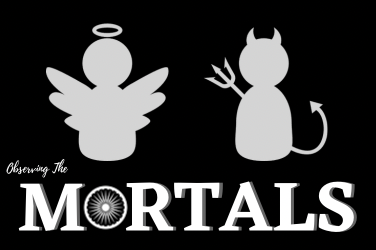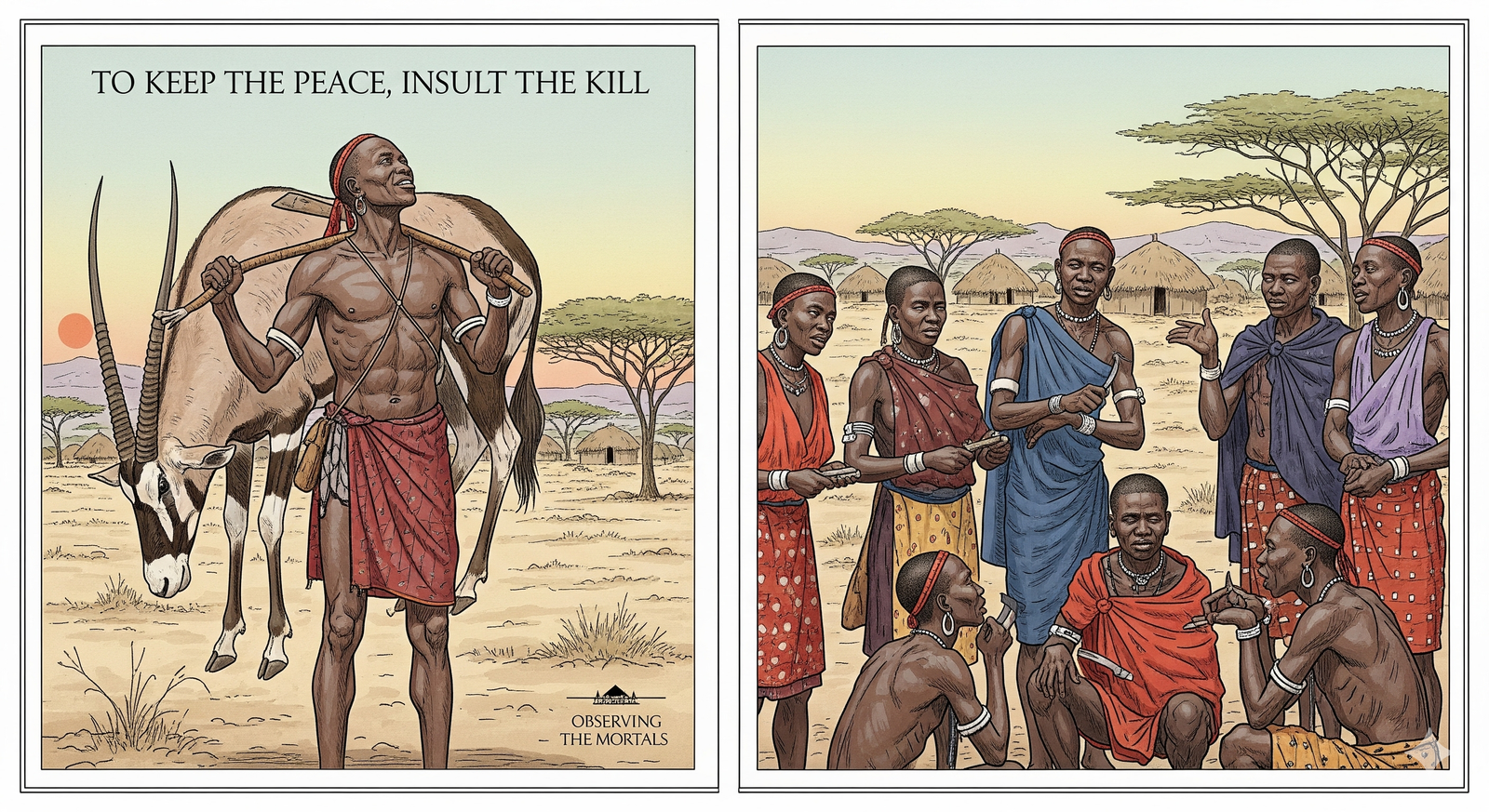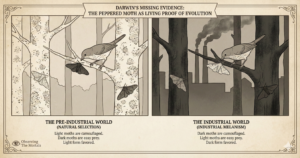In our modern world, success is met with praise, bonuses, and promotions. Individual achievement is placed on a pedestal. Now, imagine a society where the correct response to a star performer’s greatest success is not applause, but ridicule and mockery. This is the world of the !Kung San hunter-gatherers of the Kalahari, whose famous practice of “insulting the meat” reveals a profound and counter-intuitive secret to creating a truly egalitarian society. This case study explores how a simple custom serves as a sophisticated political tool to prevent arrogance, enforce humility, and maintain social order without any need for rulers.
The Information Box
Syllabus Connection:
- Paper 1: Chapter 4 (Political Anthropology: Stateless Societies, Social Control), Chapter 3 (Economic Anthropology: Hunter-Gatherers, Reciprocity)
Key Concepts/Tags:
- Insulting the Meat, Leveling Mechanism, Egalitarianism, Acephalous Society, !Kung San, Richard Lee
The Setting: Who, What, Where?
Our setting is the Kalahari Desert of Southern Africa (covering parts of Botswana and Namibia). The community is the !Kung San (also known as the Ju/’hoansi), a foraging society whose way of life has provided anthropology with some of its most important insights into egalitarianism. The key account of this practice comes from the renowned Canadian anthropologist Richard B. Lee, particularly from his essay “Eating Christmas in the Kalahari” and his classic ethnography, The Dobe !Kung.
The Core Argument: Why This Study Matters
This is not just a quirky custom; it is a highly effective form of political technology designed to actively produce and maintain equality in a leaderless (acephalous) society.
- The Problem of Arrogance: For the !Kung, who survive through meticulous sharing and cooperation, individual arrogance (hubris) is a profound social threat. A successful hunter who becomes boastful might begin to see the kill as “his” property, distribute it unfairly to create dependencies, or attempt to command others. This would be the first step towards inequality and would shatter the cooperative foundation of their society.
- “Insulting the Meat” as the Solution: The practice is a pre-emptive social strike against pride. When a hunter brings a large, successful kill back to camp, the other members of the group will show indifference or actively belittle it: “What is this? A bag of bones? We can’t eat that!” This forces the successful hunter to remain humble and reinforces the core cultural value that the meat belongs to everyone. The hunter is merely an instrument of the group’s collective good.
- Egalitarianism is Produced, Not Natural: This is the key theoretical insight. The !Kung are not egalitarian simply because they lack possessions. Their equality is a fragile state that requires constant social work to maintain. “Insulting the meat” is that work. It is an active, conscious social strategy to “level” any individual who might rise above the others, ensuring that social harmony is preserved over individual ego.
- The Anthropologist’s Lesson: Richard Lee famously experienced this firsthand. As a Christmas gift, he bought the largest, fattest ox he could find, expecting to be praised for his generosity. Instead, the !Kung relentlessly told him he had bought a worthless, skinny old animal. He was deeply confused and hurt until he finally understood the lesson: in their society, there are no truly free gifts that can be used to indebt others. By insulting his grand gesture, they were teaching him their most important political rule—that humility is paramount.
The Anthropologist’s Gaze: A Critical Perspective
- Harmony vs. Reality: While the mechanism is designed to prevent conflict, it doesn’t eliminate it. A critical view would note that this model can sometimes present an overly harmonious picture. Real tensions, jealousies, and violent disputes still occur. “Insulting the meat” is a tool for managing the potential for conflict, not a magic bullet that removes it.
- The Focus on the Male Hunter: The classic example centers on a male hunter and his kill. An anthropologist would ask how these leveling mechanisms operate in the domain of women, who are the primary and more reliable food providers through gathering. While less dramatic, their contribution is vital, and it is important to explore the parallel social dynamics that govern their roles.
- Subtle Forms of Influence: The society is “acephalous” (headless), but is it truly without any form of leadership? While there are no formal chiefs, skilled healers, exceptional storytellers, or respected elders can wield significant informal influence. The model of perfect equality might obscure these more subtle, non-authoritarian forms of social power.
The Exam Angle: How to Use This in Your Mains Answer
- Types of Questions Where It Can be Used:
- “How is social order maintained in stateless societies?”
- “Discuss the concept of egalitarianism in the context of foraging societies.”
- “Explain what is meant by a ‘leveling mechanism’ with ethnographic examples.”
- Model Integration:
- On Social Control: “In stateless societies like the !Kung San, social order is maintained through informal mechanisms rather than formal laws. The practice of ‘insulting the meat,’ as documented by Richard Lee, serves as a powerful leveling mechanism to curb a successful hunter’s potential arrogance and reinforce the community’s core egalitarian ethos.”
- On Egalitarianism: “Egalitarianism in foraging societies is not a passive state but an active social achievement. Practices like the !Kung’s ‘insulting the meat’ are a form of political technology, constantly working to ‘produce’ equality by preventing any single individual from accumulating undue social status.”
- On Leadership: “The acephalous political system of the !Kung San is maintained by customs that actively prevent the rise of ‘big men.’ The ritualistic ‘insulting the meat’ of a hunter’s kill is a classic example, prioritizing collective humility over individual authority and ensuring decisions remain consensual.”
Observer’s Take
The genius of “insulting the meat” lies in its profound, counter-intuitive wisdom. In a world increasingly obsessed with individual achievement, public praise, and the accumulation of status, the !Kung San offer a powerful alternative philosophy. They teach us that community and equality are fragile constructs that must be actively and vigilantl protected from the universal human tendency towards ego. Their method—using humility as a political tool—is a radical and enduring anthropological lesson. It reveals that sometimes, the most sophisticated systems of governance don’t rely on palaces and police, but on the simple, powerful act of reminding everyone that they are, first and foremost, part of a whole.





